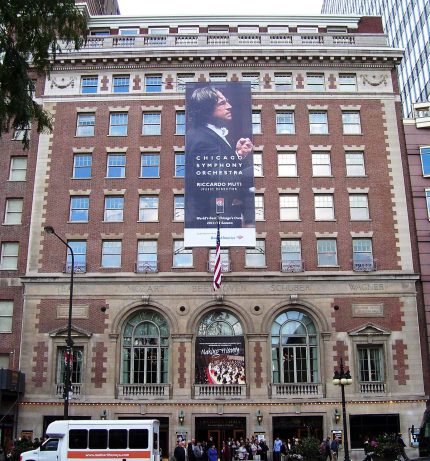CSO musicians are on strike; will begin picketing outside hall Monday morning
The musicians of the Chicago Symphony Orchestra are on strike after walking out of contract negotiations Sunday night at 9:30 p.m. Their current contract expires at 11:59 p.m. Sunday, and they say they will not return to work until a new contract is reached.
This is the first CSO musicians strike in seven years since they walked out for two days in 2012.
In a statement released from their union’s PR firm, the musicians said they will start walking a picket line in front of Orchestra Hall at 8 a.m. Monday.
“As of today, the Musicians of the CSO are on strike,” said Steve Lester, CSO bassist and chair of the musicians negotiating committee. “Beginning at 8 am on Monday morning, March 11, picket lines will stretch across all of the doors of Orchestra Hall through 8 p.m. daily until a contract that is fair to the musicians is reached. It is requested that no orchestra, performer or patron cross the line.”
The CSO strike means that no Symphony Center Presents or other non-CSO performances will take place at Orchestra Hall for the duration of the strike. That would effectively cancel Anne-Sophie Mutter’s recital on March 17 and the San Francisco Symphony concert on March 26 among many others.
The CSO Association released a statement late Sunday night from CSO board chair Helen Zell, saint that they are trying to balance the best benefits or the players with the long-term financial security of the orchestra.”
“As Board members we are responsible for the financial well-being of the Association that governs the orchestra, not only in the present, but well into the future so that Chicago has a symphony for future generations,” the statement read.
“It is for these reasons that we believe we must secure both
the musicians’ future and that of the Association’s by updating our pension structure and agreeing on a complete compensation package that is sustainable. It would be irresponsible for the Board to continue to authorize a pension program that jeopardizes the Orchestra’s future.”
“We remain committed to the success and long-term health of the Chicago Symphony Orchestra so that future generations may experience its magnificent performances and educational activities. We look forward to the eventual resolution to a new contract for our musicians, andwe appreciate the tremendous support the Orchestra receives from corporate, foundation and individual donors and the patrons who share our love of inspirational symphonic music.”
The last management proposal would have raised the musicians base pay 5% over a three-year contract: $160,606 (1% increase) the first year, following by $163,818 and $167,094 (2% increases) the following years.
Management states that these increases would make the CSO the highest-paid orchestra in the country, apart from the substantial housing and cost of living bonuses given to players in Boston and San Francisco, which are much more expensive places to live.
But the main area of conflict that caused the musicians to break off talks late Sunday night continues to be management’s determination to shift retirement benefits from a defined benefit plan–which they say is financially untenable–to a direct contribution plan. See Saturday’s CCR story for more details on the CSO contract proposal.
“The walk out and forming a 12-hour daily picket line is driven by management’s insistence on reducing retirement benefits,” says David Sanders, longtime member of the orchestra’s cello section. “When the orchestra is performing at the top of its game and having its best year ever at the box office, we’ve got to protect the artistic integrity of one of the world’s great orchestras.”
Posted in Uncategorized


Posted Mar 10, 2019 at 10:37 pm by myra jost
That pay is lower than LA and San Francisco and certainly an increase over five years that doesn’t even match the yearly increase is Social Security’s calculations.
Management seems to forget that it’s the musicians that are the only asset the orchestra has.
Posted Mar 10, 2019 at 10:39 pm by myra jost
Sounds like a bad deal 5 percent a year maybe but 5 percent overall would be a loss. Management should remember no one comes to see them or the building – just the musicians – TAKE GOOD CARE OF THEM. They’re priceless
Posted Mar 11, 2019 at 10:05 am by Kit
Without the orchestra, the CSO would not exist. Better to cut some other expenses rather than put salary & benefits for musicians on the line.
Posted Mar 11, 2019 at 5:20 pm by Patrick E Haavig
thats making a lot of cash to be worried about someone else making your pension benefits for you…I plan on Boycotting these rich babies.
Posted Mar 13, 2019 at 12:08 am by Robert Prindle
It is disappointing and frankly unfathomable why managements and BOD’s seem to believe that anyone attends because of THEIR contributions. The attendance of their patrons rests SOLELY on the musical achievements of the musicians. If BOD members or managements find their contributions (be it fundraising or administration) are too difficult or challenging they can be thanked and move on. A member of the BOD is easy to replace: another extremely wealthy individual will be interested. And accountants, administrators, managers, while valuable are also replaceable: there is a long list of capable people from a variety of opera and symphonic institutions who would gladly join their ranks at CSO (including, who knows, some across town?).
Finding musicians of CSO caliber, however, would NOT be so easy to replace. One wonders if the BOD/management want the best or are aiming for mediocre. Perhaps the person who thinks the musicians are “rich” and intends to boycott (as well he should if he feels this way), would buy tickets to a so-so orchestra.
Bravo to Maestro Muti BTW. One wonders if another orchestra on strike recently would have had a different outcome if they had received the same support from their music director.